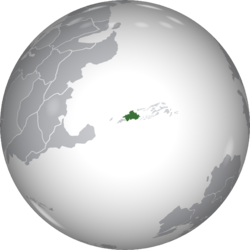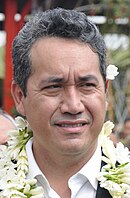Rotorua
Republic of Rotorua | |
|---|---|
Motto: ᚏᚑᚈᚑᚏᚒᚐ ᚑᚒᚏ ᚆᚑᚋᚓᚂᚐᚅᚇ Rotorua, to tatou fenua ai'a Rotorua, our homeland | |
 Location of Rotorua | |
| Capital and largest city | Papara |
| Official languages | Rarotongan Gandorian |
| Recognised regional languages | Akaroan |
| Ethnic groups (2023) |
|
| Demonym(s) | Rotoruan |
| Government | Unitary parliamentary republic |
• Raatira | Tamaroa Manutahi |
| Orirau Tetohu | |
| Legislature | Apooraa |
| Independence from New Gandor | |
• Independence | September 13, 1939 |
| Area | |
• Total | 89,765 km2 (34,658 sq mi) |
| Population | |
• Estimate | 5,136,000 (2023) |
| GDP (nominal) | 2023 estimate |
• Total | ₵33.954 billion (39th) |
• Per capita | ₵6,611 (40th) |
| HDI (2023) | 0.681 medium · 38th |
| Currency | Rotorua Cap (RCP) |
| Time zone | AMT+14 (RST) |
Rotorua, officially the Republic of Rotorua, is an island country in the southern Kivu Ocean. It constitutes the eastern part of the island of Te Punga, bordering only the Gjorkan autonomous district of Dontalamh. Home to a population of 5,136,000, Rotorua is a parliamentary republic with it's capital and largest city in Papara.
Prior to colonization, the island of Te Punga was inhabited by the native Pani people. The island has had a nominal presence by either Gjorkans or Gandorians since at least 100 AD. The island was intensely disputed between Gjorka and New Gandor, with the two nations fighting numerous skirmishes and wars over the region. The split of the island between Gjorkan and Gandorian rule caused a cultural shift within the Pani people, with the those on the Gjorkan side becoming considered as part of Akaroan culture and those on the Gandorian side becoming part of Rotoruan culture. In 1921, the Gandorian government passed the Rotorua Act giving the island self-governing status within New Gandor, before ultimately giving Rotorua independence in 1939. New Gandor still retains a significant military presence on the island with the Nowy Lublin Naval Base, and having guaranteed protection of the country per the Rotorua Act. Rotorua is also a member of the Ostlandet Union.
A developing nation, Rotorua ranks near the bottom in the world with the 39th largest nominal GDP, 40th nominal GDP per capita and 38th highest Human Development Index.
Contents
Etymology
History
Early History
Gandorian Colonization
Gandorian Colonial Rule
Rotoruan Independence Movement
First Rotoruan Republic
1955 military coup
Republic of Te Punga
Te Punga War
Return to Democracy
Recent history
Geography
Government and politics
Rotorua is a unitary parliamentary republic. The country's legislature is the unicameral Apooraa which is made up of 160 members elected to represent individual districts. Almost all government functions are based out of the capital city of Papara
The Raatira is the ceremonial head of state of Rotorua and is elected to seven year terms that are renewable once. The Raatira primarily serves as a figurehead, however they are entrusted with several constitutional powers such as the ability to schedule elections or invite parties to form a government. The current Raatira is Tamaroa Manutahi.
The Prime Minister serves as the head of government and is appointed by the Raatira, the head of state, with nomination from the Apooraa. The Prime Minister has almost always been the leader of the party to win a majority or plurality of seats within the Apooraa. The current Prime Minister is Orirau Tetohu.
Elections to the Apooraa are held at a maximum of every four years, however snap elections can be called at the Raatira's discretion with the advice of the Prime Minister. Rotorua has typically featured a weak two party system between the centre-left Socialisty Party and centre-right opposition (historically the Nationalist Democratic Party and recently the People's Movement), however third parties still hold significant influence in Rotoruan politics often being necessary to form coalition governments.



